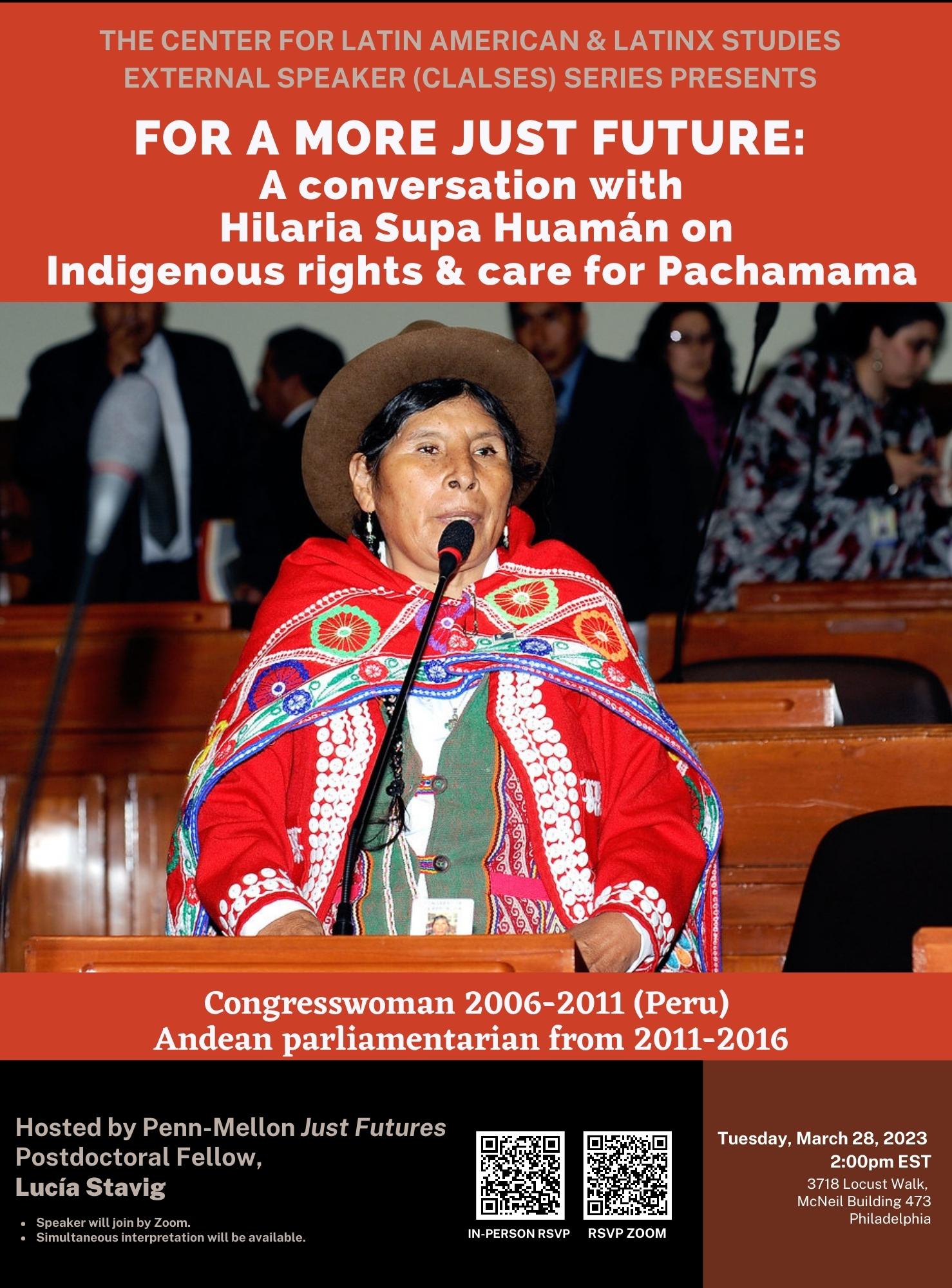CLALSES
Hybrid event
In-Person RSVP 473 McNeil Building, 3718 Locust Walk
ZOOM RSVP
If you want to join physically, but don't understand Spanish, please bring a device to join the simultaneous interpretation via Zoom (phone, laptop or tablet plus headphones). If this is the case, we highly recomended you also register via zoom before the time of the event.
For both in-situ and remote simultaneous translation, please review these instructions.

As part of our External Speaker Series (CLALSES) we will host a conversation with Hilaria Supa Huamán and the Penn-Mellon Just Futures Postdoctoral Fellow Lucía Stavig, who invites her as a guest her Seminar: Health and Healing in the Abiayala (the Americas).
In this conversation, the honorable Hilaria Supa will address the infringement of Indigenous rights, the present climate crisis, and Runa (Quechua) peoples' struggles to revitalize their cultures and create Runa futures. A global thinker, Hilaria Supa invites us to consider our responsibilities to our brothers and sisters around the world as we collectively face political, social, and climate struggles--though in different registers. She addresses why it is important for peoples not of the Andes (including those in the academy) to learn about Runa cosmovisions, ethics, politics, plants and medicines not as knowledge-for-knowledge's sake or for profit, but as means of collective survival. Together, we can make a better world.
Hilaria Supa Huamán (born 1957) is a Peruvian politician, human rights activist, and an active member of several Indigenous women's organizations in Peru and the world. She was a Congresswoman representing the Cusco for the period 2006-2011.
Born before indigenous peoples in the Andes were freed from perpetual servitude under the hacienda system in 1969, she saw the hacendado or farm owner mistreat her grandfather and rape the local women, which had a crucial impact on her life. Her grandfather, who fought for farmers rights, was murdered in 1965.
In the 1980s she became involved with other Indigenous women in organizing a community program that provided with free meals for poor children. She became leader of the Micaela Bastidas Committee in Anta, Cusco and took part in the fights for land rights. She was also leader of the Federación Departamental de Campesinos del Cusco, the regional organization of the Confederación Campesina del Perú in Cusco.
In 1991 she became the Organizational Secretary of the new founded Women's Federation of Anta (Federación de Mujeres de Anta FEMCA), where she was responsible for alphabetization programs, traditional medicine preservation and pesticide issues.
Hilaria Supa has taken part in numerous international women rights meetings, where she has actively used and promoted her Native Quechua language. In 1995 she led a protest and lobbying against forced sterilization of women and men, done under the dictatorship of Alberto Fujimori.
Hilaria Supa was elected to the Peruvian Congress in 2006, taking the oath in Quechua, followed by her fellow Congresswoman María Sumire. Doing this she became the first parliamentarian in Peru's history to take the oath in any Indigenous language. Congresswoman Hilaria Supa participated twice at the United Nations Permanent Forum on Indigenous Issues, where she denounced the crisis that her community was facing, after free trade policies and abusive decrees had been passed by the Peruvian government of Alan García in complicity with the U.S. government.
In August 2010 Hilaria was elected president of the Education Commission of the Peruvian Congress. In April 2011 Hilaria was elected as candidate of Gana Perú into the Andean Parliament. After finishing her term in 2016, Hilaria moved back to her home community in Anta where she currently resides to restart the healing center, Mosoq Pakari Sumaq Kawsay, which serves forcibly sterilized women and their communities.

 Center for Latin American and Latinx Studies
Center for Latin American and Latinx Studies